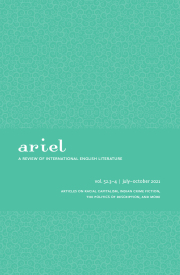Actual, Possible, Edible: Metabolic Description in Aminatta Forna’s Happiness
Keywords:
Energy Humanities, Metabolism, Globalization, Contemporary Literature, DescriptionAbstract
This essay responds to critical skepticism about the politics of description, suggesting that careful, empirical description does not necessarily endorse the status quo. Against theoretical approaches that see descriptions of everyday life as static “filler,” this essay reads quotidian details—particularly details about food and eating—as dynamic narrative motors. Taking up Aminatta Forna’s 2018 novel, Happiness, alongside debates in the energy humanities, it seeks to illustrate the way Forna’s descriptive investment in metabolic cycles serves as a counter-discourse to her novel’s overt valorization of cosmopolitan resilience. In Happiness, “metabolic description,” both expands the novel’s scalar reach and troubles the ontological boundaries between the eaters and the eaten. It also offers a specifically formal method of engaging with the energy humanities. Ultimately, the essay concludes, attention to food descriptions in realist fiction can reveal three things: a literary energy imaginary beyond oil, a dynamic continuity between organism and environment, and an attendant destabilization of the globalized liberal subject.


